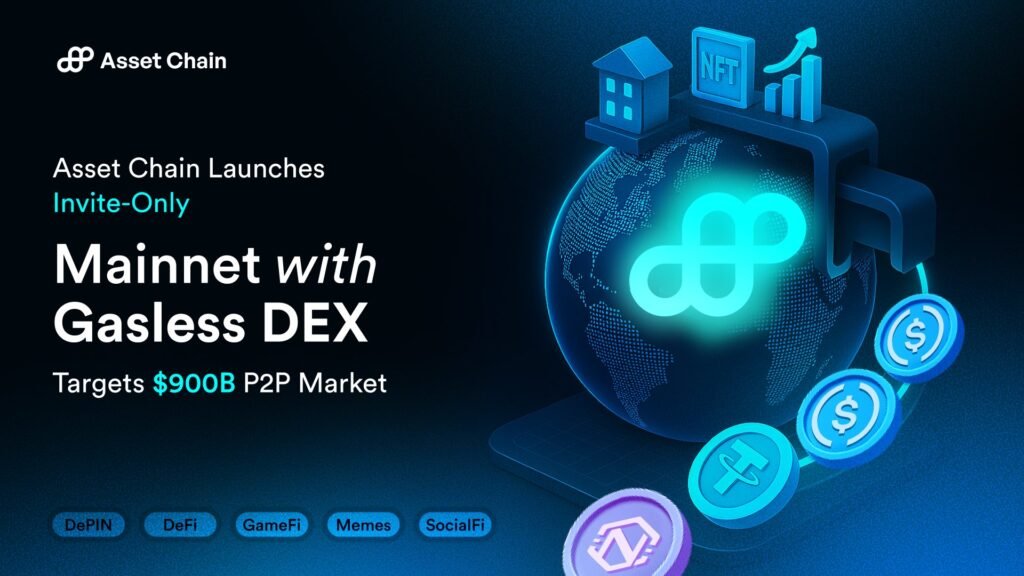In Brief
-
Asset Chain’s gasless DEX eliminates transaction fees, enabling secure, instant crypto trading in Nigeria using cNGN and USDT.
-
Automated smart contracts replace risky P2P interactions, enhancing fraud prevention and user trust.
-
The DEX platform expands beyond crypto to include real-world asset tokenization, backed by compliance and local infrastructure.
Africa’s blockchain ecosystem just went from adopting technology to introducing new ideas.
Asset Chain, a homegrown blockchain infrastructure pioneer, has officially launched its Layer1 blockchain network, introducing a new decentralized exchange at the heart of Africa’s crypto frontier, Nigeria.
Its main selling point? It’s a gasless DEX, meaning users don’t pay transaction fees. Is it revolutionary? Most definitely. Is it practical? Let’s see how Asset Chain achieved this new frontier.
The Gasless Advantage: Removing Barriers to Entry
Asset Chain has emerged as a dedicated Nigerian Blockchain venture, conceived and built to empower the local trader.
Its core mission is clear: to provide a safer, faster avenue for Nigerians to trade both digital assets (like cryptocurrencies) and real-world assets (RWAs).
However, this new frontier takes an unprecedented approach as gas fees are a primary earner for most providers within the space.
The new gasless DEX enables users to trade using USDT, powered by Tether, and Nigeria’s recent trending asset: cNGN, a Naira-backed stablecoin.
Ugochukwu Aronu, the company’s CEO and co-founder, stated:
Traders will buy USDT with cNGN without talking to anyone, and the settlement is instant. Also, traders don’t pay gas fees. It is free of charge (sponsored) on Asset Chai.
Nigeria is, by all means, Africa’s crypto powerhouse, accounting for $59 billion in transactions in 2024 alone.
According to the report, stablecoins, preferably USDT and USDC, accounted for almost 43% of Africa’s total crypto volume.

As estimated, Nigeria also led this category.
CHECK OUT: Xend Finance: Revolutionizing DeFi and Real-World Asset Tokenization for Global Investors
Instant crypto settlement is a prime reason why most African traders opted for digital assets. However, various hurdles still obscure full adoption.
Gas fees, payment for network validators, often fluctuate widely depending on various periods throughout the trading cycle. This usually deters smaller traders, making these new platforms a goldmine for serious traders.
Tackling the P2P Problem: Security Through Automation
Despite its inherent golden ticket, the Asset Chain Blockchain aims to tackle more than just fluctuating prices.
According to Ugochukwu, this new DEX aims to tackle the issue of fraud as well.
Within the past few years, it’s been made painfully clear how naive most Africans can be when it comes to crypto trading.
Nigeria, being Africa’s leading ecosystem, is also its leading hive of fraudsters.
The Nigerian blockchain firms are diving into the P2P crypto market to solve this very issue with their inherent superior security features and smart contracts.
Here’s how DEX prevents P2P fraud:
Instead of requiring users to coordinate and trust each other manually, trades are automated.
When the user initiates a trade on the Asset Chain blockchain, its smart contract takes over verifying the trade details and matching compatible buyers and sellers based on pre-set conditions (like price and amount).
To unlock the funds held, both parties must fulfil their obligations, eliminating the risk of one party defaulting after receiving payments.
This creates a fundamentally secure P2P crypto trading platform within a decentralized exchange, enabling users to retain control over their funds with the added security bonus.
The firm clarified that the gasless DEX offers a “seamless experience similar to popular P2P exchanges but with added security and privacy, ensuring users control their funds at all times.”
Current Status and Future Vision
The launch phase is strategic, focusing on curating only serious traders.
Currently, the DEX is on an invite-only basis; however, this isn’t a capacity issue with the network already tested to handle over 20,000 transactions per second.
Their main goal is on liquidity and practicality, having over 200 traders already active with hundreds more expressing interest.
The company has set an ambitious target of ₦100 billion ($65 million) in trading volume within the first 60 days. However, this figure is plausible given the firm’s current reputation.
Beyond facilitating crypto trades, the blockchain firms are also involved in tokenized real estate and other tangible assets.
CHECK OUT: 20 Startups Join Lisk Incubation Program for African Blockchain Scaling.
The firm intends to eventually enable users to buy, sell and invest in fractional ownership of Nigerian real estate, agricultural products, and even government bonds.
Their recent partnership with Risevest aims at providing just that, while also offering a yield of up to 15% annually.
Crucially, to ensure these digital tokens genuinely represent real-world value and mitigate risk, Asset Chain mandates rigorous identity verification, insurance, and compliance checks for asset issuers through its partner company, Assetbase.
A Catalyst for Safer, More Inclusive Finance?
Asset Chain’s vision goes beyond providing gasless DEXs or tokenized real estate; it ensures that value is generated and circulated within Africa.
Aronu stated:
“We can’t just keep contributing to other blockchains and platforms without getting any value in return. We must have our infrastructure that attracts and captures value globally.”
Rather than sending payment value to foreign platforms, the firm aims to build Africa for Africa.
Instead of relying on international brands like Base, Ethereum and Solana, the firm takes a stand and advocates that Africa can do the same and even better.
If it achieves the scale envisioned, Asset Chain could become a cornerstone of a safer, more transparent, and locally controlled digital asset ecosystem for Nigeria and beyond.


1 comment
[…] CHECK OUT: Asset Chain Launches Gasless DEX Platform for Nigerian Crypto Traders and Investors […]